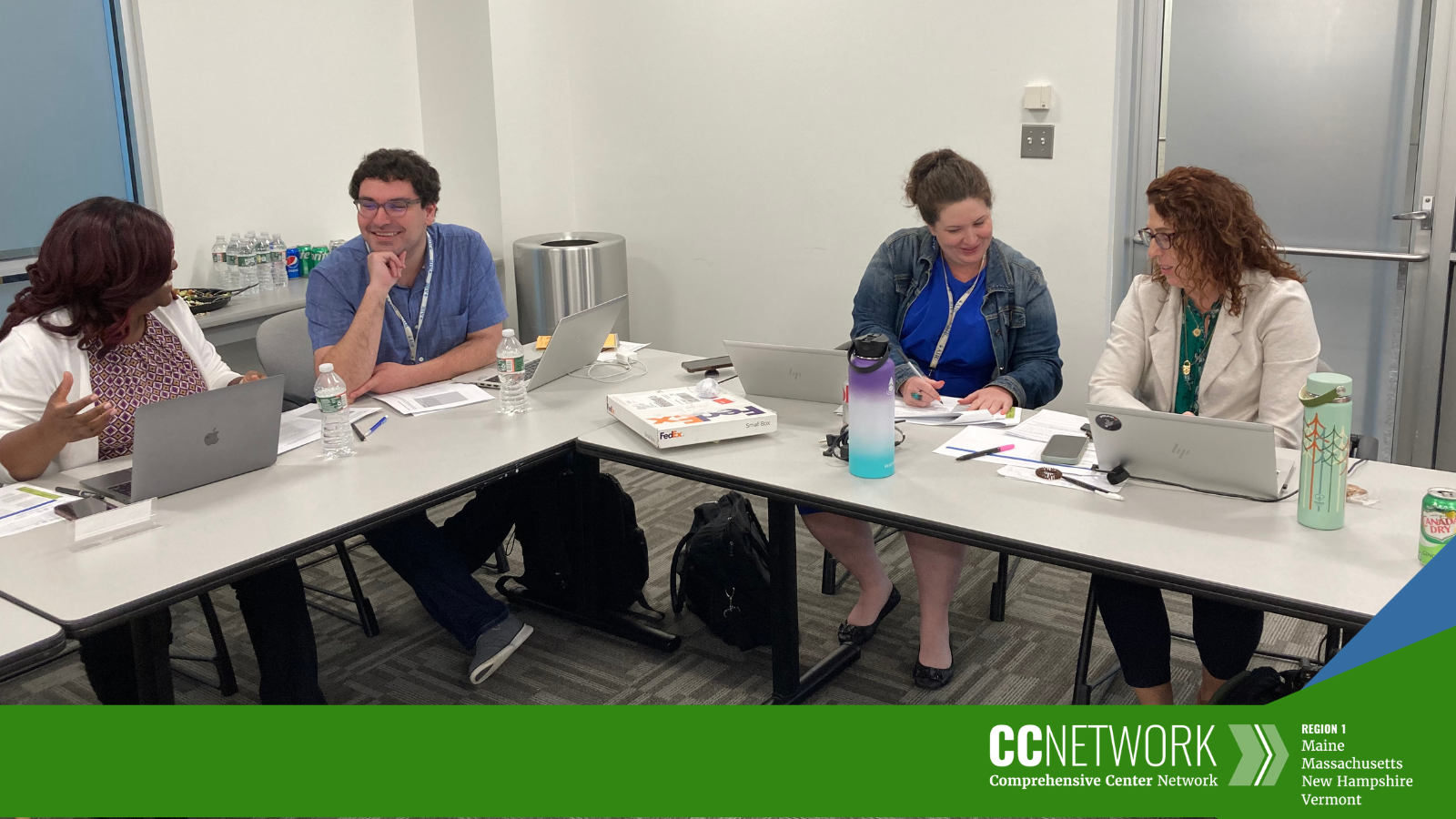
States throughout the northeast region are dedicated to improving education and related outcomes for every student. That commitment shows in the priority topics identified for our Year 5 projects, which focus on evidence-based literacy instruction, strengthening the educator workforce, college and career readiness, student mental health, and supporting newcomers.
The Region 1 Comprehensive Center team recently came together for an in-person retreat to discuss our annual service plans, which detail the work plan for each state project for the year. Each state has 2-3 projects that address a high-leverage priority for education leaders. Here is an overview of the projects prioritized across the region for Year 5 (October 2023 – September 2024), the final year of this funding cycle.
In the image on the right, R1CC staff members discuss their projects for Year 5 at the retreat in Waltham, Massachusetts.
Literacy

Region 1 states recognize early literacy as a building block for later educational success and have prioritized the use of high-quality instructional materials to improve literacy outcomes. They are committed to improving literacy outcomes for all students, reducing achievement gaps, and providing educators access to evidence-based instructional materials and interventions.
States in Region 1 have invested in multi-faceted efforts to achieve these goals and are working with R1CC on the following projects to bolster their existing efforts.
Adolescent Literacy Intervention Selection Tool (A-LIST) Development and Training
R1CC is working with the Massachusetts Department of Elementary and Secondary Education (DESE) to develop and expand the Adolescent Literacy Intervention Selection Tool (A-LIST) — a tool that helps schools and districts select literacy interventions that align with both the Institute of Education Sciences (IES) practice guide Providing Reading Interventions for Students in Grades 4–9 and culturally and linguistically sustaining practices.
Supporting Vermont’s Districts to Implement Local Literacy Plans
R1CC is working with the Vermont Agency of Education (AOE) to develop and assist with the dissemination and use of a Literacy Playbook. The playbook will support supervisory unions and supervisory districts as they develop robust literacy plans. The Literacy Playbook supports districts in addressing the recommendations in the Literacy Blueprint.
Regional Workshop: Equipping Literacy Instructional Leaders in Choosing Literacy Interventions
R1CC will facilitate a regional, two-day workshop for R1CC SEA and district literacy leaders. The workshop will model the process defined in the A-LIST project, where participants calibrate on a rubric developed from the IES Practice Guide: Providing Reading Interventions for Students in Grades 4-9 and a rubric defining culturally and linguistically sustaining practices. Participants will then apply those rubrics to a literacy intervention currently used by educators in the northeast region. Participants will actively apply a process for reviewing literacy interventions that can be brought back to their own states and district, and the ratings generated in the review will be uploaded to the A-LIST tool.
Educator Workforce

Region 1 states and districts are making an intentional effort to implement evidence-based strategies to support the educator workforce and professional development initiatives.
Leaders in the region are committed to recruiting, retaining, and providing high-quality professional development for their teachers, administrators, and support staff. They have partnered with R1CC to increase their capacity to harness data to identify areas for improvement and provide individualized support to new teachers.
Supporting Maine’s Education Innovation and Improvement Through Rethinking K-12 Models Education Grant
R1CC has been working with the Maine Department of Education (MDOE) since Year 1 to promote a culture of innovation, equity and excellence across districts in the state through the Rethinking K-12 Education Models Grant: Rethinking Responsive Education Ventures (RREV). In Year 5, R1CC will continue to act as a thought partner, identify research related to coaching and facilitation, disseminate lessons learned tools associated with the district innovation, and co-develop resources to disseminate lessons learned from the RREV grant including materials developed over the course of the grant.
Pilot of Educator Workforce Data Tools in Maine
R1CC has supported the Maine Department of Education (MDOE) to create data tools to help the state and districts understand the root causes of their educator shortages and develop strategies to address their educator workforce needs. R1CC will develop and pilot educator workforce data metrics and processes and provide coaching support to district leaders to interpret an action plan on the data generated. In Year 5, the team will also disseminate the tools and resources publicly.
Developing and Implementing Differentiated Induction and Mentoring Programs for Provisionally and Emergency Licensed Teachers in Massachusetts
Recognizing that alternative certification pathways are a critical strategy for supporting a diverse teacher pipeline, DESE is supporting a district Community of Practice (CoP) that explores how districts can differentiate their mentoring and induction practices that target the unique needs of these teachers. The CoP will focus on understanding best practices for differentiation, applying tools in their own district, and supporting the refinement of the tools and resources.
Student Support

Students are facing unique crises that require accessing a network of supports. Two topics that emerged as a priority for Year 5 include student mental health access and supporting English language learner students who have experienced interruptions to the formal education (SLIFE).
Supporting a Whole-Student Approach in SLIFE Identification
The number of SLIFE arriving in Massachusetts has increased significantly over the past few years — many of whom have experienced natural disasters, violence, persecution, and/or trauma. R1CC will continue to support DESE in developing guidance for districts to welcome, identify, screen, determine placement, and identify academic and non-academic supports for SLIFE. Part of this work includes developing a 5-step process for identification, intake, assessment, and support of SLIFE as one part of a more comprehensive set of supports DESE is implementing this year.
Strengthening Access to School-Based Mental Health Supports for Vermont Students
The pandemic has emphasized the need to focus on the social-emotional and mental health needs of students and their families and the Vermont AOE is committed to ensuring that districts across the state have equitable access to mental health supports. In Year 5, R1CC will focus on the sustainability of the state mental health mapping resource, which created a geographic information system (GIS) map to visualize the distribution of how mental health services for students are distributed across the state. . R1CC will provide training and support to policy makers and school-based mental health providers on how to use and sustain the map, data analysis sessions, developing dissemination resources, and transferring the ownership of the map to the Vermont AOE.
College and Career Readiness

Each student should have an opportunity to engage in a well-rounded education that can support their goals and needs. Region 1 states are exploring education pathways through career and technical education (CTE) program alignment and by strengthening math pathways between secondary and postsecondary education.
Helping New Hampshire Align Career and Technical Education (CTE) Programs with Workforce Needs
CTE programs provide students with the opportunity to learn the academic and technical skills needed for high-wage, high-demand (HWHD) occupations. As the New Hampshire Department of Education (NHED) continues to approve new CTE programming in the state, NHED leaders needed a resource to help them understand which CTE pathways were aligned to HWHD occupations.
To support this effort, R1CC developed an interactive map that displays the HWHD occupations for each county and which CTE programs are aligned to those occupations. R1CC will continue to support CTE program directors and the NHED in using this tool to further align program offerings and job opportunities in New Hampshire.
Strengthening Implementation of Math Pathways in Maine
Different careers require different types of math skills, yet all students are required to complete the same mathematics coursework, regardless of its relevance to future career goals. This can create unnecessary barriers to college completion and career success. R1CC is working with the Maine Department of Education, the Maine Community College System, the University of Maine System and other interest holders to develop a vision for new K-16 math pathways that set students up for success throughout their post-secondary experiences, careers and beyond.